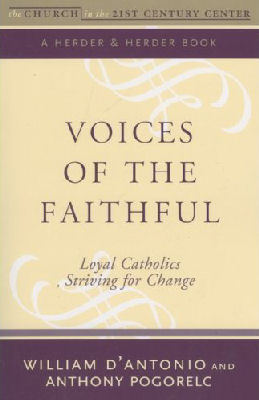
|
Posted October 10, 2007
Book: Voices of the Faithful: Loyal Catholics Striving for Change Authors: William D’Antonio and Anthony Pogorelc A Herder and Herder Book. New York. 2007. Pp. 252 An Excerpt from the Jacket:
Who were these active Catholics who found ways to make the news? Were they, as some feared, angry dissidents seeking to bring down a church and assume power for themselves? Or were they loyal Catholics striving to renew the church? Voices of the Faithful presents original research on the history, religious beliefs, practices, and attitudes of this new religious group. Based on their empirical research, the authors show that VOTF member represent educated and energetic people of faith with deep roots in Catholic culture and tradition. The authors also introduce assessments of VOTF from respected historians and theologians. The remarkable findings presented in this volume make for challenging and inspiring reading for VOTF members and anyone interested in church reform. An Excerpt from the Book: In her analysis, Hines proposes that the model of the church from which VOTF operates may be called an ecclesiology from below, because it embraces the People of god image used by Vatican II and stresses that the Holy Spirit can work from the grass roots up. There is a tension between ecclesiologies that emanate from above, centered on Christ’s action through the hierarchy, and from below, centered in the action of the spirit through the Body of Christ. Hines advises that all parties, including VOTF, need to realize that no one model captures the totality of the church. She reminds both hierarchy and laity of the important passage in chapter 12 of Lumen Gentium: The body of the faithful as a whole, anointed as they are by the Holy One. . . .cannot err in matters of belief. Thanks to a supernatural sense of the faith which characterizes the People as a whole, it manifests this unerring quality when, “from the bishops down to the last member of the laity,” it shows universal agreement in matters of faith and morals. She goes further to urge VOTF not to excuse itself from matters of faith and morals. For chapter 12 of Lumen Gentium surely suggests that “decision on faith and morals arrived at without participation of the faithful are significantly deficient.” Theologians Hines and Imbelli both stress that the laity and the hierarchy must take each other seriously. This is essential for the working of the church in the modern world. Likewise both Hines and Dillon urge VOTF not to divorce its focus on church structure from mission and doctrine. Laity must learn to link their ecclesiology from below with the ecclesiology from above so that in the spirit of Lumen Gentium the whole church — laity, priests, and bishops — is included. Table of Contents: 1. VOTF as a social movement in the Catholic Church 2. VOTF’s founding leaders 3. VOTF members: who they are and why they stay 4. VOTF members: gender, generation, and region 5. The social sources of dissent: voice of the Faithful in a changing Catholic Church -- Nancy T. Ammerman 6. Bringing doctrine back into action: the Catholicity of VOTF Catholics and its imperative 7. Voice of the faithful survey: an ecclesiological reflection -- Mary E. Hines 8. The faith we are called to keep . . . and to spread -- Robert P. Imbelli 9. The virtues of loyalty -- William A. Gamson 10. Fundamental strategic tasks for leaders organizing grassroots insurgencies, with particular reference -- John D. McCarthy |
|
